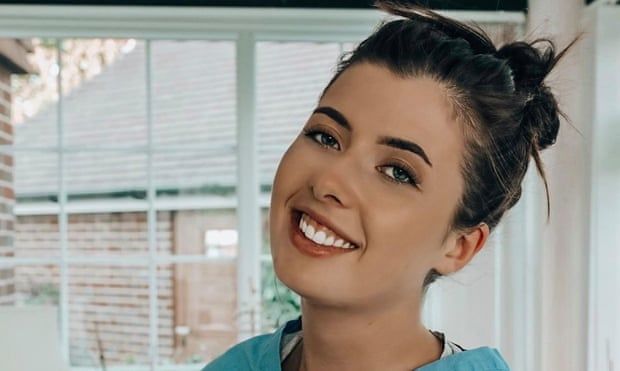
‘Exhausted’ medical students in England struggle to qualify amid financial woes
On a recent Sunday, Eilidh Garrett worked a six-hour shift at her part-time job in car finance. After a four-hour break, the third-year medical student then set off for a 12-hour overnight placement.
Each week for Garrett, 25, is a balancing act of working part-time to make ends meet, while struggling to prioritise her studies. She has little downtime and has ended up in hospital from financial stress in the lead-up to recent exams.
“I couldn’t tell work that I couldn’t come in this week because I’ll lose my job,” Garrett said. With no financial support from her parents, her £10 hourly wages barely touch her £4,000 credit card debt.
“It feels like we’re constantly looking out for the NHS by trying to be there and be doctors but the government isn’t looking out for us,” she said.
She is not alone. In April, Garrett and three other medical students started a Twitter campaign, #LiveableNHSBursary, calling for a review of the financial aid medical students receive during their training. Students have since flocked online to share their stories of financial hardship, often detrimental to their studies and careers.
In their first four years, undergraduate medical students in London – in line with other students – are able to access loans up to £12,382. But they are uniquely placed in their final two years: students are able to apply for an NHS means-tested bursary of up to £3,191 each academic year and non-means tested grant of £1,000.
Additional allowances are granted to those living outside London or with parents. Medical students in their final years can also access a reduced maintenance loan from Student Finance England up to £3,354.
 Each week for medical student Eilidh Garrett, 25, is a balancing act of working part-time to make ends meet.
Each week for medical student Eilidh Garrett, 25, is a balancing act of working part-time to make ends meet.
The financial shortfall has left many students struggling to complete their degrees, amid soaring inflation and a shortage of doctors.
“I don’t really understand why the system, where we’re short of NHS doctors year-in and year-out … why are we deterring students from being able to finish a degree?” asked Anna Sigston, medical student lead at the Doctors’ Association UK.
Under the hashtag, one student said he worked 25 hours a week on top of his 30-hour placement. Another said she had worked 10 jobs to get through medical school. Even those who don’t face the same financial burden are calling attention to the funding shortfalls.
Khadija Meghrawi, co-chair of the BMA medical students committee, said it was a government failure.
“For years, we’ve heard instances of students using food banks, overburdened by debt and exhausted by working long hours alongside studying. No student should have to choose between completing their degree and making ends meet,” she said.
A spokesperson for the Department of Health and Social Care said: “We are committed to supporting medical students in England across all years of study and continually keep funding arrangements for all healthcare students under review.”
MPs have also joined the calls. In a letter to the secretary of state for health and social care, Labour’s Clive Lewis said: “All student doctors should have the same chance of getting to the end of their courses, regardless of family and personal incomes.”
The concerns are reminiscent of 2017, when NHS bursaries for midwives, nurses, and other healthcare professions were replaced with student loans. It resulted in a nursing shortage, fewer course applications, and the government reintroducing grants years later.
 Anna Harvey Bluemel says memories of her financial woes as a medical student still haunt her.
Anna Harvey Bluemel says memories of her financial woes as a medical student still haunt her.
For Garrett, the experience has changed her attitudes towards being a doctor.
“I love the NHS and I wanted to do this specifically because of the NHS. However, if the government are refusing to treat us properly, even this early on in our career, it doesn’t bode very well for the future,” said Garrett.
According to a 2018 survey, four in 10 medical students in the UK said they or someone they knew had considered dropping out of studying because of financial pressures – although the true number of struggling students is masked by the stigma around discussing hardship.
According to research by the London School of Economics in 2017, nearly 73% of doctors were from professional and managerial backgrounds, and less than 6% from working-class backgrounds.
As a qualified doctor now working in Cumbria, the spectre of Anna Harvey Bluemel’s financial woes still haunt her.
“There’s probably now more medical students than ever who are in financial dire straits because of the increasing cost of living,” said Harvey Bluemel, who received £10,000 in financial support while studying in London. “This funding was inadequate, and has always been inadequate.”
She added: “It harms the profession. And I think it harms patients, because our medical profession does not reflect the makeup of the society that we serve in the UK,” she added.
“There is a lot of effort being made to remove some of the barriers that particularly working-class students have,” she said. “But I think that the idea that once you’re in, you’re exactly the same as everyone else. And it’s just not the case.”










